
Isabel Martínez de Perón is an Argentine former politician who served as the 41st President of Argentina from 1974 to 1976. She was one of the first female republican heads of state in the world, and the first woman to serve as president of a country. Perón was the third wife of President Juan Perón. During her husband's third term as president from 1973 to 1974, she served as both the 29th Vice President and First Lady of Argentina. From 1974 until her resignation in 1985, she was also the 2nd President of the Justicialist Party.
The Trotskyist Fraction – Fourth International (TF-FI) is a political international of Trotskyist political organizations that claim to adhere to the political legacy of the Fourth International.

The United Socialist Workers' Party is a Trotskyist party in Brazil. It is the largest section of the International Workers' League (LIT), an international body of groups in the Morenoist tradition.

The General Confederation of Labor is a national trade union federation in Argentina founded on 27 September 1930, as the result of the merger of the U.S.A and the C.O.A trade unions. Nearly one out of five employed – and two out of three unionized workers in Argentina – belong to the CGT, one of the largest labor federations in the world.

The Socialist Workers' Party, previously known as the Workers Party for Socialism, is a Trotskyist political party in Argentina. It was founded in 1988 by expelled members of the Movement for Socialism (MAS). MAS was a Trotskyist party led by Nahuel Moreno until his death.
The Argentine Anticommunist Alliance was an Argentine Peronist and fascist political terrorist group operated by a sector of the Federal Police and the Argentine Armed Forces, linked with the anticommunist lodge Propaganda Due, that killed artists, priests, intellectuals, leftist politicians, students, historians and union members, as well as issuing threats and carrying out extrajudicial killings and forced disappearances during the presidencies of Juan Perón and Isabel Perón between 1973 and 1976. The group was responsible for the disappearance and death of between 700 and 1100 people.

The Workers' Revolutionary Party was a Marxist political party in Argentina, mainly active in the 1960s and 1970s. Currently there are different groups that claim to be a continuation of the historical PRT.

On 16 June 1955,
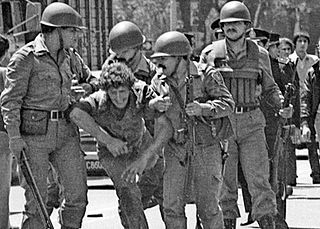
Saúl Edólver Ubaldini was an Argentine labor leader and parliamentarian for the Peronist Justicialist Party.
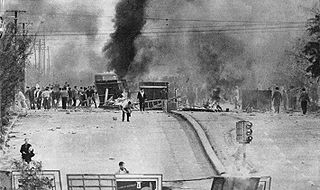
The Cordobazo was a civil uprising in the city of Córdoba, Argentina, at the end of May 1969, during the military dictatorship of General Juan Carlos Onganía, which occurred a few days after the Rosariazo, and a year after the global protests of 1968. Contrary to previous protests, the Cordobazo did not correspond to previous struggles, headed by Marxist workers' leaders, but associated students and workers in the same struggle against the military government.
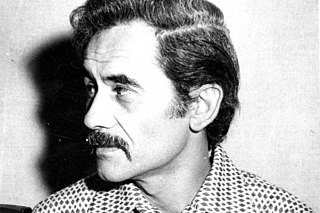
José Ignacio Rucci was an Argentine politician and union leader, appointed general secretary of the CGT in 1970. Close to the Argentine president Juan Perón, and a chief representative of the "syndical bureaucracy" ; he was assassinated in 1973.
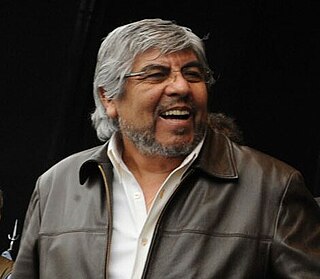
Hugo Moyano is an Argentine labour leader who was secretary general of the CGT, the country's largest trade union, from 2004 to 2012. A schism developed within the CGT during 2012, and Moyano was elected to head the CGT's dissident faction. He was also the president of Club Atlético Independiente, one of the biggest football clubs in the country, and treasurer of the Argentine Football Association. He is the founder and leader of the Party of Culture, Education and Labour (CET).

Juan Domingo Perón was an Argentine lieutenant general, politician and statesman who served as the 29th president of Argentina from 1946 to his overthrow in 1955, and again as the 40th president from October 1973 to his death in July 1974. He is the only Argentine president elected three times, and holds the highest percentage of votes in clean elections with universal suffrage. Perón is the most important and controversial Argentine politician of the 20th century, and his influence extends to the present day. Perón's ideas, policies and movement are known as Peronism, which continues to be one of the major forces in Argentine politics.
Movimiento de Agrupaciones Obreras was a political labour organization in Argentina. MAO was founded in mid-1957 by a Nahuel Moreno's Trotskyist tendency. MAO formed part of the trade unionist resistance to the Revolución Libertadora.
The Workers' Socialist Movement, known for many years as the Workers' Socialist Party, is a Trotskyist political party in Bolivia. PST/MST was affiliated to LIT-CI for a long period.
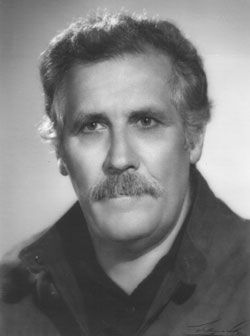
Nahuel Moreno was a Trotskyist leader from Argentina. Moreno was active in the Trotskyist movement from 1942 until his death.
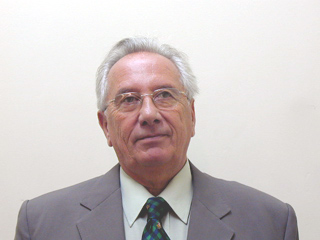
Héctor Recalde was born on 28 May 1938 in Buenos Aires. He is an Argentine lawyer and politician who specializes in labor and political law. He was a national deputy for Buenos Aires province between 2005 and 2017. He was the spokesman for the Front for Victory in the Chamber of Deputies.
Tendencia Revolucionaria, Tendencia Revolucionaria Peronista, or simply la Tendencia or revolutionary Peronism, was the name given in Argentina to a current of Peronism grouped around the guerrilla organisations FAR, FAP, Montoneros and the Juventud Peronista. Formed progressively in the 1960s and 1970s, and so called at the beginning of 1972, it was made up of various organisations that adopted a combative and revolutionary stance, in which Peronism was conceived as a form of Christian socialism, adapted to the situation in Argentina, as defined by Juan Perón himself. The Tendencia was supported and promoted by Perón, during the final stage of his exile, because of its ability to combat the dictatorship that called itself the Argentine Revolution. It had a great influence in the Peronist Resistance (1955-1973) and the first stage of Third Peronism, when Héctor J. Cámpora was elected President of the Nation on 11 March 1973.
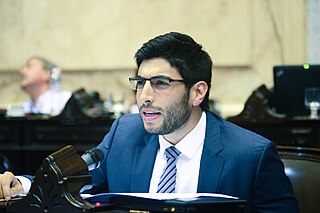
Juan Facundo Moyano is an Argentine trade unionist and politician. A member of the Party of Culture, Education and Labour (CET), Moyano was a National Deputy for Buenos Aires Province from 2011 to 2021.
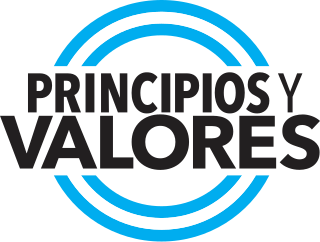
The Principles and Values is an Argentine political party founded on 17 October 2020. The party considers itself Peronist, which strongly embraces the ideas of Juan Perón, and has been described as orthodox peronist and right-wing, but they identify themselves as centrist or third position. It has definitive legal status as a district party in the Province of Buenos Aires.
















